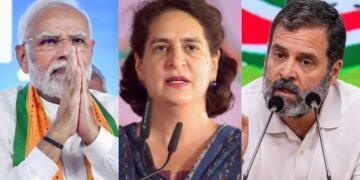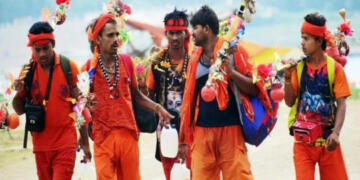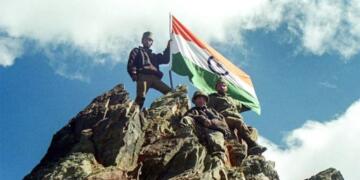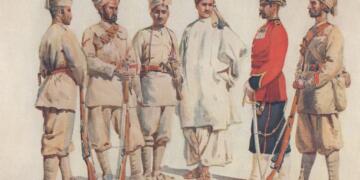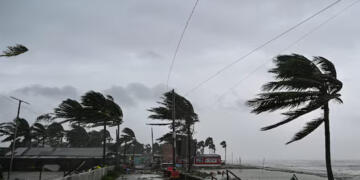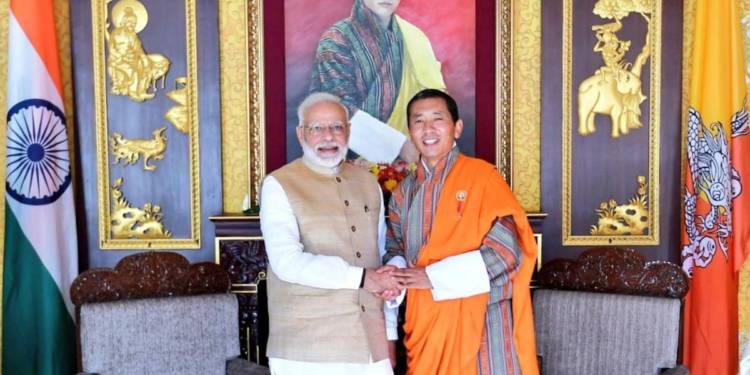When it comes to credibility, Indian media would rank the lowest among all the media throughout the world. Generally, it’s a known fact that media houses are running a business too which makes them often run inaccurate facts just to gain TRP, but Indian media can be called the champion of corrupt reporting. Had it been the matter of gaining TRP only, people might have been tolerant to ignore its activity. But when it comes to bad reporting that may damage even bilateral relations among two countries, no other country’s media can surpass the Indian media. Indian media, with its bad reporting, has almost created rift between friendly nations and its citizens.
The most recent hitjob by the Indian media is its factually incorrect reporting regarding the water stoppage by Bhutan govt. Back in 26th June 2020, several renowned media houses like Times Of India, Statesman, Business League, etc had reported that Bhutan has stopped releasing water for an irrigation channel along its border with India near Assam which if true, would affect at least thousands of farmers from 25 villages. It has also been reported that Indian farmers who used to cross over to divert sections of a river in Bhutan into channels that irrigate farms in Assam, had been prohibited from doing so. The mentioned channel has been in use since 1953 and water stoppage on such a channel actually makes the situation critical. So it is easy to understand what impact this news could have had on the India-Bhutan relationship.
It is reported that on Thursday June 25th 2020, IANS first reported that Bhutan has stopped release of water.
After #China, #Pakistan and #Nepal, now #Bhutan has also started hassling #India. Thimphu has stopped releasing channel water for irrigation along its border with India near #Assam, affecting thousands of farmers in 25 villages of the region.
Photo: IANS pic.twitter.com/VGVuVcs2FC
— IANS (@ians_india) June 25, 2020
Though the news itself was enough to make the situation tense among the two nations, the choice of words for the headline was typically a nasty one. “After China, Pakistan and Nepal, now Bhutan has also started hassling India”- were the exact words which IANS used in its tweet. Following the footsteps of IANS, The Statesman too had remarked in their headline- “After Pak, Nepal, China’s ally Bhutan hassles India, ‘stops’ releasing water for irrigation”. The Business League followed same narrative and remarked- “After Sino-Nepal, Bhutan now created problems for India, stopped irrigation water”.
All these headlines were laden with vile intentions- intentions of creating propaganda that somehow, GoI’s current foreign policy has made India’s neighbors distancing themselves from India. The sole purpose is to show the current GoI a pinnacle of failure when it comes to foreign relationships.
The incorrect news by Indian media was not welcomed by Bhutan. Both Bhutan and Govt. of Assam had said that the flow of water was blocked naturally. Bhutan side in fact, said that they have been doing repairs in channels to ensure smooth flow of water to Assam. Chief Secretary of Assam, Kumar Sanjay Krishna confirmed the claims by Bhutan by saying that Bhutan has been actually helping to clear the blockage. Mr. Krishna even tweeted along with the pictures of dozens of people working on fixing the channel.
Bhutan had rejected India media’s reports by terming them “totally baseless” and a “deliberate attempt” by vested interests to cause misunderstanding with India. In a statement, Bhutan’s Ministry of Foreign Affairs said that there have been several news articles published in India alleging that Bhutan has blocked water channels that supply irrigation water to Indian farmers in Baksa and Udalguri districts in Assam adjoining the country’s Samdrup Jongkhar district. “This is a distressing allegation and the Ministry of Foreign Affairs would like to clarify that the news articles are totally baseless as there is no reason why the flow of water should be stopped at this time,” it said. “It is a deliberate attempt by vested interests to spread misinformation and cause misunderstanding between the friendly people of Bhutan and Assam.”
The editor of The Bhutanese newspaper in Thimpu, Tenzing Lamsang had earlier lambasted the Indian media for its deliberate lies-
For those who are falsely speculating that Bhutan blocked some canal water to India.
Due to heavy rains there was natural blockage & Bhutanese officials &ordinary citizen volunteers have been working around the clock to clear it with zero Thanks.
Assam Chief Secretary confirms. https://t.co/0yelzSEi2m
— Tenzing Lamsang (@TenzingLamsang) June 25, 2020
Decades of inaccurate or even fake news on Bhutan by media outlets in India has hurt the credibility of Indian media in Bhutan.
Final breaking point was the fake water stoppage story.Now on social media any Bhutan news from India is dismissed as fake by most ordinary Bhutanese.
— Tenzing Lamsang (@TenzingLamsang) July 1, 2020
Indian media’s debacle, whether unintentional or deliberate, are not a new phenomenon in yellow journalism. In fact, Indian media has played a pivotal role in influencing a lot of people from both Nepal and India to be unfriendly to the other country. It all started back in 2015 when India helped out Nepal during the massive earthquake which shook our Himalayan neighbor to the core. Natural calamities are one of the toughest times in history of any country and during that time any helping hand, even a small one, is welcomed with appreciation. On the other hand, what irks most during these tough times is how one creates obstacle during any rescue operation. Indian media had been lambasted by the Nepal citizens due to its insensitivity and this had been proved by the infamous twitter hash tag trend #GoHomeIndianMedia.
In thousands of tweets, people of Nepal had complained that the coverage by the Indian media had been insensitive and jingoistic. In her blog, a blogger named Sunita Shakya of Nepali origin accused Indian media personnel of acting like they were shooting some kind of family serials. She wrote- “If your media person can reach to the places where the relief supplies have not reached, at this time of crisis can’t they take a first-aid kit or some food supplies with them as well?”
There were many allegations and accusations on Indian media about their behavior while reporting the earth quake. A reporter seized a wounded survivor and paraded her in front of the cameras rather than putting some cloth to stop the bleeding. Another one asked a woman whose only son was buried under a wreck, “How do you feel?”
Indian Army had been the largest foreign team on the soil of Nepal that were leading the rescue operations with 704 personnel, followed by China (168), Bangladesh (140) and the US (120). Though Indian Army had rightly earned the enormous praise for the enormous effort it had put, the behavior of Indian media had embarrassed India massively.
Our media continues to embarrass&dismay India: http://t.co/mr6BETvLtM Thx2Nepal coverage, #GoHomeIndianMedia trends on WorldPressFreedomDay!
— Shashi Tharoor (@ShashiTharoor) May 3, 2015
There had been various instances where Indian journalists and Nepal’s liaison officer (who was coordinating media personnel) were engaged in arguments. On one such occasion, a TV journalist could be heard rudely telling the officer that it was his right to go along with the Indian Army’s chopper. “My countrymen are taking part in the rescue operations and it is my duty to go along with them,” the journalist said. In fact, a lot of Nepalese had accused the Indian media of disrupting smooth rescue and relief operation on their way to reporting. This in fact had enraged the Nepalese citizens so much that a section of Nepalese people and Nepalese media even reported that Indian helicopters and rescue teams were not coordinating with Nepalese counterparts and were flying to places close to the Chinese border. Later, the Nepal Army debunked the shameless reporting by the Nepali media and clarified that this was a mistake and happened because the Indian pilots were not familiar with the terrain.
This bitter relation between India and Nepal still prevails today which is evident from the news report by Annapurna Express, which never questioned the intention of Nepal PM Oli for publication of the political map of the country including Kalapani, Lipulekh, and Limpiyadhura, but calls Indian media jingoist for speculating China’s growing association with Nepal to be the prime factor behind this. Instead of highlighting protest by Nepalese citizens against PM Oli, certain Nepalese media refers India’s diplomatic stance with Nepal as hegemonic attitude and accuses that India doesn’t treat Nepal as a sovereign country.
Indian media’s idiocy can be seen while reporting India – Sri Lanka relationships too. Though Sri Lanka PM Mahindra Rajapaksa’s recent India visit in early 2020 was a successful one, there were some differences which were not cleared upon. PM Rajapaksa called India a “relation” while mentioned others as “friends”, clearly suggesting that Sri Lanka is not in mood of taking sides against China.
In fact, Rajapaksa defended China by saying Beijing helped Colombo in Sri Lanka’s post-war reconstruction and development efforts. He went on to note that the debt toward China is only 12 percent of the overall external debt and that the funds from China were used for developing infrastructure.
Moreover, Sri Lanka wants to see “cooperation and progress in SAARC,” whereas India believes that all efforts to strengthen regional cooperation should be channeled to the Bay of Bengal Initiative for Multi-Sectoral Technical and Economic Cooperation (BIMSTEC). It should be noted that countries which aren’t having any shores on Bay of Bengal, precisely Nepal and Pakistan, aren’t part of BIMSTEC. Given India’s larger strategic footprint across the Indo-Pacific and India’s Act East policy, BIMSTEC makes sense. But Sri Lanka is not keen. India needs to work on building support for it in other capitals in South Asia.
Also, New Delhi has to be able to offer economic opportunities for these countries to make BIMSTEC attractive. Otherwise it will be seen as just empty anti-Pakistan rhetoric with no real worth for the small countries in the region. More generally, India should also be careful not to alienate the smaller countries who might not want to antagonize China. Also, Rajapaksa’s one more point of concern is to request India to consider postponing the debt repayment for three years. Sri Lanka believes that if India agrees, then Sri Lanka can convince other countries too, especially China.
However, situation became awkward after Covid-19 broke out. As per reports, it was decided that the Indian Army would send rapid response teams to Sri Lanka, Bangladesh, Bhutan and Afghanistan, just like the medical team it sent to the Maldives early during the outbreak. These teams were aimed to help boost these countries’ capabilities in dealing with the ongoing health crisis. This was clearly India’s biggest foreign policy move in recent times. Significantly, the Army’s rapid response teams will not go to two countries, Pakistan and Nepal. However, a section of media reported the news in such a fashion that it made it look as if India was going to deploy under cover soldiers in Sri Lanka, while in reality, the team was comprised of only doctors, both military and civilian. The MEA had to come out and clarify that India wasn’t deploying any army abroad.
Very recently, one write up by Suhasini Haider was published in The Hindu with a libelous headline – “With India yet to respond on debt freeze request, Sri Lanka turns to China” which suggest that Sri Lanka had already approached China, while later in the content, the same write up speaks about a possibility that Sri Lanka MAY turn to China. As per reports, the two sides have been discussing regarding holding the loan repayment on the total $960 million that Sri Lanka owes India, as well as two separate Sri Lankan requests for a currency swap facility. MEA had said that they have proposed a virtual meeting between New Delhi and Colombo, but they received no response from Sri Lankan side, leading to no definite outcome yet. Sri Lanka is scheduled to repay $2.9 billion of its total external debt this year and has so far made three requests to India – a debt moratorium and two separate requests for a currency swap facility. The reports clearly said that Sri Lanka had not responded to the request of India for further talks, but the headline misguides people to think it was India who didn’t respond back.
Recently, Sri Lanka has decided to relook the pact with India and Japan to develop and run the East Container Terminal of the Colombo Port. PM Rajapaksa constituted a committee of five senior officials to review the agreement for development of the deep-sea container terminal. The move came after the workers of the Colombo Port threatened to go on an indefinite strike if the government allowed any foreign country to develop the Eastern Container Terminal (ECT). The report claims that India suspects China’s role in this sudden decision to review the pact. Reporting like this which establishes a probability of suspicion might not be taken well by the island nation.




